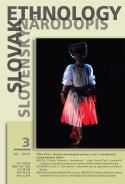Možnosti využitia modelových situácií (vinet) v antropologickom výskume morálnych postojov
The Possibilities of Using Model Situations (Labels) in the Anthropological Research of Moral Attitudes
Author(s): Kristína Miškovská, Zuzana Budzelová, Danijela JerotijevićSubject(s): Ethics / Practical Philosophy, Cultural Anthropology / Ethnology, Social psychology and group interaction, Behaviorism, Methodology and research technology, Social Norms / Social Control
Published by: SAV - Slovenská akadémia vied - Ústav etnológie a sociálnej antropológie Slovenskej akadémie vied
Keywords: methodology; model situations; emotions; disgust; labels; political attitude;
Summary/Abstract: Labels describe a fictitious situation which the contact person is supposed to asses and take a certain position. They represent a suitable complementary method of qualitative research. While in psychology they can be used as a tool for predicting behavior, in anthropology and ethnology they can be used to study norms, perceptions or attitudes. The aim of this text is to show in what way they can be linked to other types of qualitative data (participatory observation, semi-structured interviews) through an example of a long-term anthropological research studying political preferences and moral attitudes. The principal research assumption is based on Jonathan Haidt’s concept, according to which self-declared political preferences (whether an individual is considered conservative or liberal) are reflected in the sphere of moral emotions, in particular in the emotion of disgust. The results of the analysis show that all politically self-declared groups reflect morally unacceptable behavior. The biggest difference between conservative and liberal contacts was observed with respect to sexuality (e.g. sexual behavior, registered partnerships). The text points out the methodological limits of model situations: they can problematize the situations which individuals have not faced yet, as a result of which they can judge a fictitious and a real-life situation differently.
Journal: Slovenský národopis
- Issue Year: 64/2016
- Issue No: 3
- Page Range: 295-312
- Page Count: 18
- Language: Slovak

